Granma 299
July 11, conceived in the United States

The events of July 11 were conceived, organized and financed from the US.
The inventors of the narrative of popular indignation now want to build another one about a supposed spontaneous insurrection against the government, which justifies the defeat and propitiates foreign intervention in the island.
Author: Raúl Antonio Capote | internacionales@granma.cu
July 24, 2021 00:07:34 AM
Translated and edited by Walter Lippmann for CubaNews.
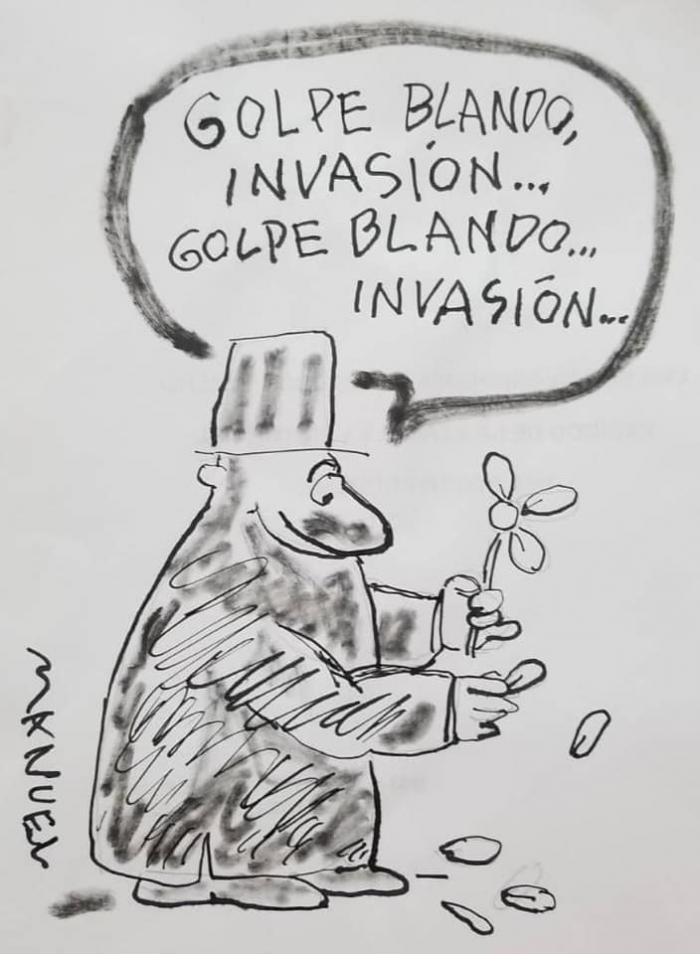
Photo: Manuel
In February 2018, following indications from then U.S. President Donald Trump, the Internet Task Force for Subversion in Cuba was created, subordinated to the CIA.
It was a new step, considered essential, to dominate Cuban cyberspace and move to a higher stage in the strategy of subversion against the Cuban Revolution.
The propaganda crusade organized by the Task Force has been characterized by a coordinated use of all the instruments at its disposal to achieve, as a central objective, the demonization of the adversary and to justify its total destruction, as they have done in so many places in the world.
As part of the White House plan, which contemplated moving on to more severe actions against Cuba, after the “failure”, proclaimed by the ultra-right, of the policy followed by Barack Obama, the Trump administration applied more than 243 measures to “close” the blockade and suffocate the island.
It was a real shock therapy aimed at discouraging any resistance and breaking people’s faith in the future.
An important part of the plan was to start “heating up the streets”, as Gene Sharp’s manual indicates with absolute precision, with actions such as those that took place in the San Isidro neighborhood or the provocations in front of the Ministry of Culture and other institutions.
COVID-19 was a “marvelous opportunity” for the enemies of the Cuban people. Of course, they could not fail to take advantage of the pandemic and the suffering it could cause.
According to the calculations of the authors and sponsors, everything was ready: with the millions destined for subversion they paid mercenaries, cyber-sicarii and criminals, repeating the script of Iran and Bolivia in 2019.
During the last days of June, already under the administration of President Joe Biden – let’s remember that the policy of that country towards Cuba is only one -, the campaign of fear and demonization was strongly increased in the networks, the Internet Task Force synchronized the entire arsenal of media, sites and digital hitmen created or bought.
It was not, as they would have us believe, a Facebook group -a space created, as there are thousands on the island, where people share, meet friends, etc.- that promoted the events of July 11 in San Antonio de los Baños.
It was an action well-planned from the outside, with high technology, promoted by hundreds of fake accounts, bots and trolls, as has been denounced in recent days by our media. They acted taking advantage of the discontent caused by blackouts, shortages and fear of the increase of COVID-19 cases.
The defeat unleashed the hysteria of the promoters of the “protests”, the managers and ideologues. The mud machine kept going, like a puppet without strings, thrashing back and forth, howling death like a wounded beast.
The inventors of the narrative of popular indignation now want to build another one about a supposed spontaneous insurrection against the Government, justifying the defeat and propitiating foreign intervention in the Island.
U.S. people send syringes to Cuba

U.S. people send syringes to save, while their government seeks to sow chaos in Cuba (+Video)
Just when the U.S. movement of solidarity with Cuba announces the shipment of six million syringes for vaccination against COVID-19, the U.S. Agency for International Development (USAID) shouts to the four winds that now, in order for the counterrevolution to access its last two million destined for subversion, it must adapt its “proposals” to what happened after July 11.
Translated and edited by Walter Lippmann for CubaNews.
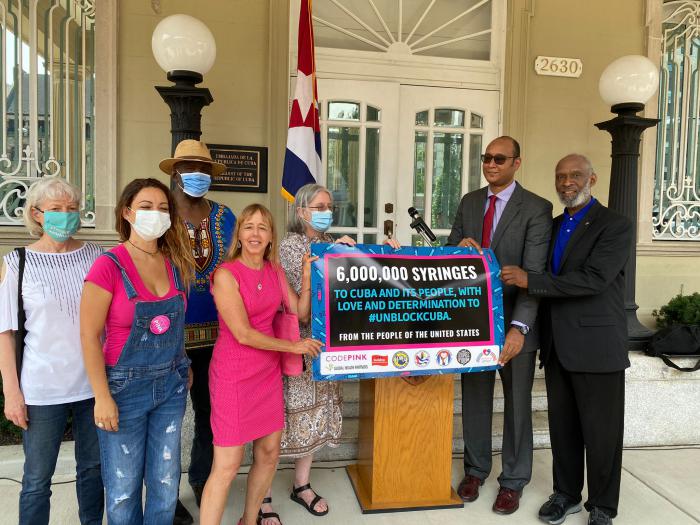
The Cuba Solidarity Movement in the United States presented the Cuban Embassy in the United States with a certificate of the donation. Photo: Cuban Embassy in the United States
The paradoxes of imperialism are beyond absurd. Just when the U.S. Cuba Solidarity Movement announces the shipment of six million syringes for vaccination against COVID-19, the U.S. Agency for International Development (USAID) is shouting from the rooftops that now, in order for the counterrevolution to have access to its last two million destined for subversion, it must adapt its “proposals” to what happened after July 11.
They seek to fuel the confrontation, the division among Cubans, and the many lies that circulate against Cuba in the main media platforms of the world, but, above all, in the social networks.
That is the reason why now, a little more than a week after that Sunday of riots, the USAID – a public face of the CIA – discloses that it will not change its objectives with respect to the island, and that, in addition, those requesting funding must design their proposals taking into account the current political situation, Cuba Money Project published.
Last June 30, USAID announced that it would finance with up to two million dollars projects that “encourage” democracy and human rights in Cuba, one of the most obvious U.S. interventionist strategies around the world, and historically used against the Cuban Revolution.
Meanwhile, since last Saturday, July 17, around two million syringes have already arrived at the Cuban port of Mariel from the Cuba solidarity movement in the United States. This is an act of love organized by Global Health Partners and with the participation of Cuban Americans and Americans, who will continue to collect funds to also send medicines, including antibiotics, painkillers, contraceptives and vitamins.
No Disappeared or Tortured in Cuba

There are no disappeared or tortured people in Cuba (+ Video)
Following the riots that took place on July 11 and 12, as part of the political-communication operation encouraged and paid for by the U.S. government against Cuba, alleged lists of missing persons have begun to circulate on the Internet.
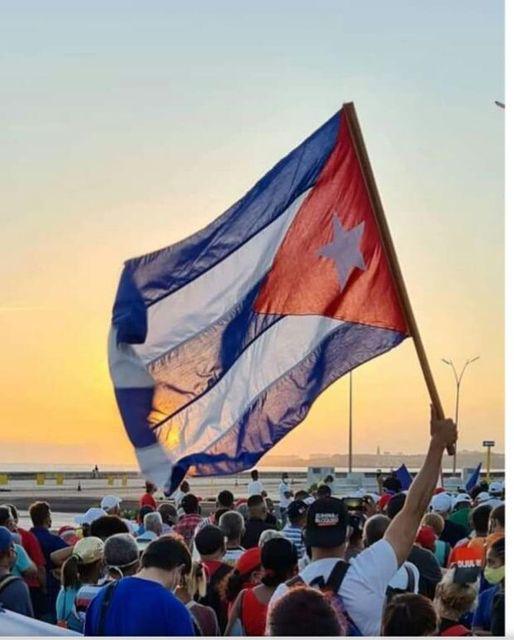
Photo: Taken from Internet
After the riots that took place last July 11 and 12, as part of the political-communicational operation encouraged and paid for by the US government against Cuba, supposed lists of missing persons have begun to circulate on the Internet.
But, are there really missing persons in the country? Are such lists real? What is the procedure for the detention of a person? What limits are there to the actions of the authorities?
In answering these questions, during an appearance this Tuesday on the program Hacemos Cuba, Colonel Victor Alvarez Valle, second chief of the Specialized Body of the General Directorate of Criminal Investigation of the Ministry of the Interior (MININT), categorically assured that in Cuba there are no missing persons, neither of the processes referred to the recent disorders, nor of any other that has been carried out.
“We have as a principle, in the Revolution, and it is also what characterizes the actions of the authorities, the right to life, to freedom, the right to the preservation and security of people,” said the colonel, while informing that Cuba is a signatory of the International Convention for the Protection of All Persons from Enforced Disappearance.
This position, he said, was also recognized in the Constitution approved by the majority of Cubans and, although in our legal system it is not characterized as a crime, there is a group of figures that cover and punish those who commit these actions, in the event that the occurrence of an enforced disappearance is proven.
 Furthermore, he added, “there is no secret establishment for the processing of persons who, for any reason, or for the commission of crimes, are taken to one of the dependencies of MININT”.
Furthermore, he added, “there is no secret establishment for the processing of persons who, for any reason, or for the commission of crimes, are taken to one of the dependencies of MININT”.
Regarding the process of detention of a citizen, José Luis Reyes Blanco, head of the Department of Supervision of the Directorate of Criminal Proceedings, of the Attorney General’s Office (FGR), explained that “the records of this process, the detention record that is signed by the person involved, the information on the detainee and the presence of the Prosecutor’s Office throughout the criminal process from the beginning, contribute to control the investigation and allow us to ensure that in our country after 1959 there have never been missing persons”. Evidently, if there were events of this nature in the country, the number of denunciations in the Prosecutor’s Office, through all its channels of attention to the citizens, would be considerable.
However, commented Reyes Blanco, in the year 2020, in the middle of the pandemic, the Prosecutor’s Office attended more than 129,000 people throughout the country; during the first semester of this year, the attention exceeded 49,000 and, as of July 12, for events associated to the riots, 63 people have addressed to this organ, mostly through face-to-face channels.
“But none of these complaints or claims have been related to disappearances”, he stressed, but to arrests, that is to say, in search of certain information, which they have received in the places to which the interested parties have gone.
Today, he commented, the Prosecutor’s Office is investigating five claims related to general non-conformities in the process, but no case is pending to define the place where the person is located. There is information and, more importantly, the family knows it”.
In this sense, Colonel Alvarez Valle pointed out that when a person is taken to a police unit, the first thing that is done is to register him/her in a logbook, manually, and the arrest record is drawn up. Therefore, the person knows why they are being taken to the station.
Then, he continued, there follows a process that can take place in the first 24 hours, which contemplates his first statement, and the measures that, depending on the crime, can be imposed.
“In the first 24 hours, the family generally knows where the person is because, in addition, MININT has a system of attention and information to the population, automated and interlinked among all units, where each of the detained persons is recorded.
“In recent cases, all the families know where their detainees are, they have gone to the places, they have delivered belongings with personal hygiene materials or specific medicines; in other words, the information on the whereabouts of the people is established and auditable by the control bodies of the Prosecutor’s Office”, he explained.
Subsequently, he also referred to the International Convention for the Protection of All Persons from Enforced Disappearance, to which Cuba is a party and was reviewed in 2017.
As applied in the country, Article 17, specifically, establishes, among other elements, that:
No one shall be secretly detained.
Without prejudice to other international obligations of the State party regarding deprivation of liberty, each State party, in its legislation:
Shall establish the conditions under which orders of deprivation of liberty may be issued.
Determine the authorities empowered to order deprivation of liberty.
Guarantee that any person deprived of liberty shall be held only in officially recognized and controlled places of deprivation of liberty.
Guarantee that any person deprived of liberty shall be authorized to communicate with and be visited by his family, a lawyer or any other person of his choice, subject only to the conditions established by law, and in the case of a foreigner, to communicate with his consular authorities, in accordance with applicable international law.
It shall guarantee the access of any competent authority and institution empowered by law to places of deprivation of liberty, if necessary with the prior authorization of judicial authority.
For his part, the prosecutor clarified that all persons detained after the events of July 11 are able to appoint a lawyer, that some do not have one is up to the choice of each individual.
And to totally deny the mentioned lists, at another moment of the program, communication was established with one of the alleged missing persons, who also spoke of other colleagues who swell the records circulated on the Internet and who are in perfect condition.
The Second Chief of the Specialized Body of the General Directorate of Criminal Investigation of MININT reiterated that these lists lose credibility due to the lack of data, and because it has been proven that many of those registered therein have never been arrested or even interviewed by the authorities.
Reyes Blanco commented that, among the detainees, a group has already been released because it has been confirmed that they have had no criminal participation, others are under a non-detaining precautionary measure, and there are defendants in the preparatory phase, with a precautionary measure of provisional imprisonment.
TORTURE WILL NEVER BE A PRACTICE OF THE CUBAN AUTHORITIES.
Another matrix that has been tried to be positioned in the social networks puts the dart in the occurrence of torture with those involved in the destabilizing actions.
Colonel Alvarez Valle said, “just like forced disappearances, torture is not a practice in Cuba. The history of the Revolution proves it, and it is not and will not be the practice of the combatants of the Ministry of the Interior to use force against those being prosecuted”. He also said that Cuba is a party to the Convention against Torture and Other Cruel, Inhuman and Degrading Treatment or Punishment.
José Luis Reyes detailed that, after the riots, the presence of prosecutors in the units has increased, because it is in the interest of hearing the opinion of the detainees, and this is a favorable scenario for dialogue and to convey any concerns or complaints.
The broadcast of Hacemos Cuba also called attention to a complaint of a young man who has escalated in recent hours in social networks, referring to acts of violence committed against him, after being detained after the riots.
This person, the colonel pointed out, is subject to a precautionary measure of house arrest for a previous process, which implies requirements that he has to comply with; however, he was in the street, outside the vicinity of his home, in the middle of the disturbances of the order, which breaks the provisions, of which he was informed.
Prosecutor Reyes Blanco added that, among the complaints in progress at the Prosecutor’s Office, there is that of this young man, since his father presented himself at the said body. All the data were taken and the pertinent inquiries and investigations will be carried out, with total transparency.
Should any irregularity arise, said the colonel, the circumstances in which the facts occurred would be clarified and the corresponding measures would be taken, either in the disciplinary order, if he were a combatant, or in the criminal order if the conduct were to be in violation of the law.
Therefore, arguments were sufficiently clear that in Cuba there are no disappeared or tortured persons, and, if any irregularity occurred or had occurred in the actions of the Ministry of the Interior or the Prosecutor’s Office, it will be investigated, the results will be made known and, if violations are found, measures will be taken to allow the restitution of legality.
Lester Mallory, The Influencer

Lester Mallory, The Influencer
Presented as an unprecedented social explosion, the events of this Sunday in the country constitute a chapter -and not a premiere- of the so-called non-conventional war.
Author: Juan Antonio Borrego | internet@granma.cu
July 13, 2021 23:07:00 PM
Translated by Walter Lippmann for CubaNews.
With the accumulation of more than six decades of blockade, the impact of the 243 measures adopted during Donald Trump’s administration -all in force until today- and the wear and tear of the already prolonged confrontation with the coronavirus crisis, now at its worst moment since its appearance in the archipelago in March 2020, it would seem that Cuba is witnessing the “perfect storm”.
Lester Mallory, the former Deputy Assistant Secretary of State for Inter-American Affairs, who died in 1994, would be rubbing his hands and boasting that it has been worth waiting 61 years to reap the fruits of the doctrine that he and his advisors conceived, drafted and did not hesitate to put on the table to the Eisenhower administration so that it could be applied.
Faced with the undeniable support of the people for the nascent Revolution, which is precisely the same that keeps it alive and well to this day, the official provided the US government with a secret memorandum containing the essence of the genocidal policy to be followed to the letter in order to overthrow the surprising revolutionary project, which by then (April 1960) was already a thorn in the empire’s side.
“The only foreseeable way to subtract internal support from it (he refers to Fidel and the Revolution) is through disenchantment and dissatisfaction arising from economic malaise and material difficulties… all possible means must be quickly employed to weaken the economic life of Cuba…. a line of action which, being as skillful and discreet as possible, will achieve the greatest progress in depriving Cuba of money and supplies, to reduce its financial resources and real wages, to provoke hunger, despair and the overthrow of the Government”, reads verbatim the document which, with greater or lesser rigor, has guided imperial policy against Cuba up to the present day.
In the fruitful television appearance this Monday, at the request of the First Secretary of the Party and President of the Republic, Miguel Diaz-Canel, Rogelio Polanco, a member of the Secretariat of the Central Committee and head of its Ideological Department, confirmed an irrefutable truth: although it is presented by certain media as a social explosion, what we have experienced this Sunday in Cuba constitutes a chapter of the unconventional war.
Indistinctly called hybrid warfare or color revolutions, fourth-generation warfare, or soft coup, the strategy followed against Cuba is part of a manual that has been rigorously applied in several countries, both in the Middle East and in Europe and also in Latin America -Venezuela, for example-, a perverse system, scientifically conceived, which, as it is easy to notice, has communicating vessels with the famous Lester Mallory’s memorandum.
Unconventional war has an important media component, now increased with the development of social networks that facilitate the generation of false news, misrepresentation, manipulation of facts and so-called half-truths, a world in which Cuba puts the news day after day and almost minute by minute, under the protection of a flourishing colony of media that presume to be independent and impartial and always have at hand the voice of an influencer or “a source who preferred not to reveal his identity”.
In this concept, nothing is more important than discrediting institutionality, denying the impact of the blockade and presenting the shortcomings that the world’s greatest power has been creating for 60 years with its web of laws, obstacles and threats to third parties, as the exclusive result of the ineffectiveness of a supposedly corrupt and obsolete government.
Another element consubstantial to this foggy but equally cruel and effective war modality is the promotion of street violence, which showed its hairy ear this Sunday in some places of the country -Güines and Cárdenas, for example-, with images of youths assaulting a store or overturning a police patrol car, the same photos that these days were on the front pages of important news media.
Provoking the forces of law and order, inducing repressive actions, seeking international condemnation, all secured from the media point of view, are also part of the ABC of unconventional war. It has been applied against the island and sustained with not inconsiderable sums of money, a “financial courtesy” whose most recent amount has just been made public in these same pages.
President Joe Biden, who pledged, not to us, but to the American electorate, to review the Trump administration’s policy towards Cuba -the last of whose measures was to include it once again on the list of state sponsors of terrorism-, then diluted along the way with the statement that it was not a priority or that he was conducting a detailed study of relations, something that six months ago seemed even logical, but today sounds very different.
What is suspicious is that only a few hours after Sunday’s events, originated in the first place by the policy of asphyxiation that his administration may not have designed, but has assumed as its own, officials of his government, and he himself, are sticking their noses into the neighbor’s problems.
Foreign Minister Bruno Rodriguez, a member of the Political Bureau of the Party, recently told the United Nations General Assembly: “Cuba’s demand is to be left in peace”, and President Miguel Diaz-Canel reiterated it, in other words, this Monday: “We are not interested in what may happen within the conception of how the government and the American people want to make their system of government, but we do demand that they respect our self-determination, sovereignty and the way in which the majority of Cubans have agreed to defend socialism”.
The haste with which these characters came out to show solidarity with the vandals, while blaming the Cuban government, reveals the interventionist approach that is being promoted and financed from abroad:
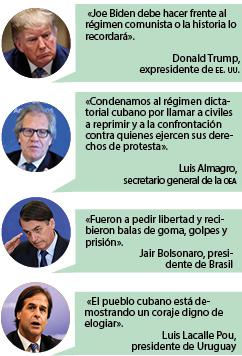
Here is the Mallory Memorandum of 1960:
https://history.state.gov/historicaldocuments/frus1958-60v06/d499
The kidnapping of Elián González

The kidnapping of Elián González and the Battle of Ideas that achieved his return.
He was returned to Cuba under the guardianship of his father seven months after his kidnapping, after the mobilization of the entire Cuban people and a long judicial process, in violation of international law and U.S. laws, since both legislations recognize that jurisdiction over these cases belongs only to the courts of the child’s country of origin.
Translated and edited by Walter Lippmann for CubaNews.
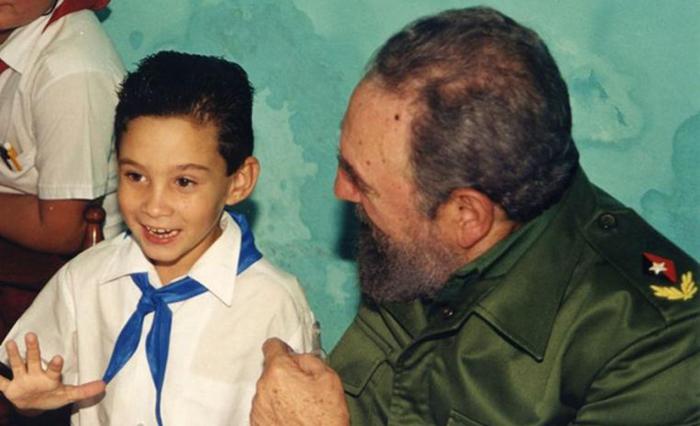
“For Elián, the best book ever written for a child…”, this is how Fidel began the dedication of the copy of The Golden Age that he gave him, on July 14, 2000, in the first meeting they had 20 years ago, after the long battle for the return of the little boy to his homeland. Photo: Granma Archive
Twenty-one years have passed since the return to the homeland, on June 28, 2000, of that six-year-old boy kidnapped in Miami by distant relatives in collusion with the Cuban-American mafia, after losing his mother in the shipwreck of a boat that was trying to reach the U.S. coasts, as a consequence of the irregular migration encouraged by the Cuban Adjustment Act.
He was returned to Cuba under the guardianship of his father seven months after his kidnapping, after the mobilization of all the people of Cuba and a long judicial process, in violation of international law and U.S. laws themselves, since both legislations recognize that the jurisdiction over these cases belongs only to the courts of the country of origin.
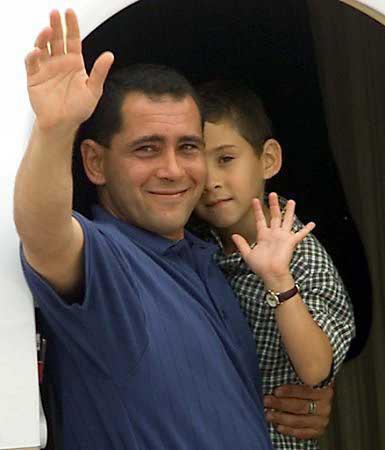
Elián González, 20 years after Cuba’s colossal battle for his return
Elián González Brotons was just a six-year-old pionero when, on November 22, 1999, his mother tried to smuggle him out of Cuba. The shipwreck of the boat in which they were traveling caused the death of 11 of the occupants except for Elián and two others. The boy, clinging to a tire, was rescued by fishermen and taken to U.S. territory, where he became, after the just demands of his father, the center of the battle of an entire people during seven months for his return.
Upon arrival in Florida, the child was placed in the care of Lázaro González, his paternal great-uncle living in Miami, who soon after, in open complicity with the anti-Cuban mafia, opposed any attempt to return him to Cuba.
Elián’s father, Juan Miguel González, was unaware of his son’s departure from Cuba and immediately requested his repatriation, an act that was supported by the Cuban Government and all its people.
In spite of the opposition of Elián’s distant relatives to his return to his country, on January 5, 2000, the Immigration and Naturalization Service (INS) of the United States recognized Juan Miguel’s parental rights over his son.
The decision was endorsed by U.S. Attorney General Janet Reno and President William Clinton, and the child was scheduled to be returned by January 14. But relatives and anti-Cuban groups in Miami appealed the decision and took the case to the U.S. courts.
On January 21, Elián’s grandmothers traveled to the United States to look for their grandson. Five days later, after multiple steps, they were able to see him, but only for a few hours, and they had to return alone to Cuba.
Faced with the silence of the U.S. authorities, on December 5, young people from the Technical Youth Brigades (BTJ) protested in front of the U.S. Interests Section in Havana (SINA), against the child’s detention.
The action was the prelude to what would later turn out to be a wave of mass demonstrations, including marches of hundreds of thousands of people -the Marches of the Combatant People-, combative Open Tribunals in different cities of the country and the beginning of the Battle of Ideas.
On December 23, 1999, in front of a group of children who guarded the U.S. Interests Section in Havana on the occasion of the march for the child Elián González, in the José Antonio Echeverría social circle, the Commander in Chief, Fidel Castro, said: “What is beginning today is the second stage of the battle of the masses that we have been waging since Sunday, December 5. It has been and is a battle of ideas, of national and international public opinion, of legal, ethical and human principles, between Cuba and the empire, which in our Homeland is supported by one of the largest and most combative mobilizations that has taken place throughout our history”.
What the SINA officials could not foresee at that time is that this would be the most prolonged and massive popular movement, of those that had taken place since January 1st, 1959, up to the present day.
Elian’s father, Juan Miguel González, traveled to Washington on April 6, but it was not until 16 days later that he was reunited with his son after a federal operation rescued the boy from the kidnappers. The maneuvers reached the Atlanta Court, which in two instances rejected demands for political asylum for Elián, but not an injunction preventing his return.
On Monday, June 26, 2000, the U.S. Supreme Court, in just two days, settled a case that had lasted more than seven months and denied all legal remedies to the abductors. On June 28, 2000, the boy and his father returned to Cuba.
“I feel happy in Cuba, that the result of that struggle led by the Cubans to which the American people and many personalities joined, led by Fidel, gave me the possibility to grow up here, to know him, to be his friend and it is my greatest pride,” Elián said on May 12, 2016.
In July 2010, Elián made public statements in which he thanked the people of Cuba and the United States for having achieved his release and supported his father Juan Miguel at all times; he also declared he did not to hold a grudge against his Miami relatives, protagonists of the kidnapping.
On December 6, 2018, the then President of the Councils of State and Ministers of Cuba, Miguel Díaz-Canel Bermúdez, congratulated Elián through his Twitter account on his 25th birthday, and recalled that the battle for his freedom, led by Fidel, showed how many challenges can be overcome together.
His hometown awarded, on December 29, 2019, the young industrial engineer Elián González the title of Illustrious Son of Cárdenas, conferred during the provincial act of Matanzas for the 61st anniversary of the Triumph of the Revolution. The title of Illustrious Son given to the already militant of the Union of Young Communists coincided with the 20th anniversary of the emergence of the Battle of Ideas.
Related information
Youth is the present and future of Cuba, says Elián González
Elián González: “Young people are not the future, they are the present”.
Special program The Battle for Elián
Orlando Borrego, on the arduous road

Orlando Borrego, on the arduous road of the Revolution
This Saturday, June 26th, Rebel Army Captain Orlando Borrego Díaz died in Havana, at the age of 85, due to problems associated with the COVID-19.
Translated and edited by Walter Lippmann for CubaNews.
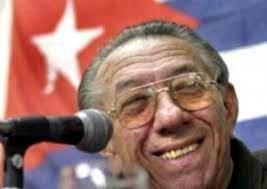
This Saturday, June 26th, Rebel Army Captain Orlando Borrego Díaz died in Havana, at the age of 85, due to problems associated with the COVID-19.
Borrego was born in Holguin, on March 3, 1936. From a very young age he began his revolutionary activities. In October 1958 he joined Column No.8 Ciro Redondo, under the command of Commander Ernesto Guevara, in the Escambray.
After the triumph of the Revolution he occupied various responsibilities as Chief of the Military Economic Board of the La Cabaña Regiment (1959) and of the Industrialization Department of INRA (1959-1960), as First Deputy Minister of the Ministry of Industries (1961-1964) and then as Minister of the Sugar Industry (1964-1968). He also served as advisor to the Executive Committee of the Council of Ministers (1973-1980) and as an economic advisor to the Che Guevara Chair of the University of Havana, as well as to the Minister of Transportation. He was also a close collaborator of Comandante Ernesto Che Guevara.
Orlando Borrego graduated with a degree in Economics from the University of Havana, and in 1980 he obtained the Scientific Degree of Doctor in Economic Sciences at the Institute of Economics and Mathematics of the Academy of Sciences of the USSR.
He was the author of several books, among them: El desarrollo de la Industria Azucarera en Cuba (1965), La ciencia de dirección, antecedentes y enfoques actuales (1987), El Che en el socialismo (1989), El Che del siglo XXI (1997) and Che, el camino del fuego (2001).
For his successful service to the Revolution he received numerous decorations and awards. His body was cremated.
Anne Frank describes enduring pain

Anne Frank describes enduring pain
Forced to walk on tiptoe, deprived of the outside world, longing for air and freedom, sharing with others that loneliness that persists even when accompanied, confident that the end would be “good,” Anne Frank lived her last two years.
Translated and edited by Walter Lippmann for CubaNews.

Photo: Cover of the book
Forced to walk on tiptoe, deprived of the outside world, longing for air and freedom, sharing with others that loneliness that persists even when accompanied, trusting that the end would be “good”, that is how Anne Frank lived her last two years.
She went from being the talkative 13-year-old schoolgirl who was always “the first to play jokes, the eternal joker,” to feeling “conscious of being a woman of moral strength and courage.”
She, whirlwind and din, independent, flirtatious, interested in the history and mythology of Greece and Rome, should be remembered not only for the causes that brought death upon her, but for the vitality with which she faced them, certain that, at the end of that terrible struggle, she would be recognized as other people and not only as a Jewess.
“I want to go on living, even after my death. That is why I am grateful to God who, since my birth, gave me the possibility (…) of expressing everything that happens in me. When I write I forget everything, my sorrow disappears and my courage is reborn. But – and this is the main question – will I ever be able to write something lasting, will I ever be able to be a journalist or a writer?”
No wonder then that, that night of March 28, 1944 while listening to the radio, all eyes around her turned to her and her diary seemed “taken by storm,” after hearing Minister Bolkestein say that at the end of the war letters and memoirs concerning that time would be collected. “Fix yourself a novel about the annex published by me! Wouldn’t that be interesting, wouldn’t it?” she left initialed in her notes on the evening.
Thanks to the memoirs she so skillfully recorded in her diary, humanity has been able to know how those eight Jews who clandestinely lived in the annex of a warehouse in Holland ate, slept, talked and spent their days, terrified by the constant bombing and the fierce fear of being “discovered and shot” by the Gestapo, all this while half the world was sinking into hunger, misery and death unleashed by the Second World War.
In Kitty – as she called “the very first surprise” she received on June 12, 1942, on her thirteenth birthday – she found someone to whom she could confide without reserve everything she was unable to express, not even to her parents and sister. Overwhelmed by family conflicts, those of adolescence and those caused by confinement, war and the feeling of being besieged, Anne gave no respite to her pen and diary, the basis of her truncated yearnings to have fun, ride a bicycle, go to school, dance, whistle, have a place in the world and work for her fellow humans.
There, amid the suffocation of confinement, she found love in Peter, the son of the family with whom the Franks shared the annex. “Every time he looks at me with those eyes (…) a little flame seems to light up in me”. Anne understood in the midst of all the horror that “he who is happy can make others happy. Whoever loses neither courage nor confidence, will never perish from misery”.
She, like so many other Jews, died in a concentration camp, just one month before it was liberated. Today, when the world is plunged in hatred and conflicts, the firmness of spirit is the best tribute to that young woman murdered by human monstrosity.
Secretariat of PCC Central Committee

Secretariat of the Central Committee, at the forefront in the direction of the Party’s work.
With full presence in the political, economic and social life of the country, the members of the Secretariat professionally deal with the daily activities of the Party, for which they control, in their sphere of action, and with the help of the auxiliary structure of the Central Committee, the work of the institutions and agencies of the State and the Government.
Author: Yudy Castro Morales | yudy@granma.cu
27 May 2021 01:05:20
Translated and edited by Walter Lippmann for CubaNews.
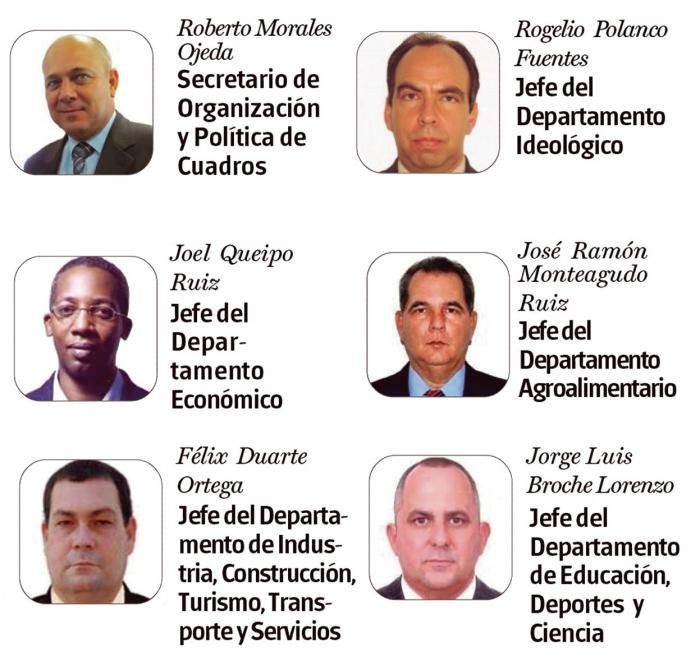
The intense days of debates that took place during the 8th Congress of the Communist Party of Cuba outlined the ideas, concepts and guidelines that will guide today and in the future the work of the organization at all levels.
To continue strengthening the performance of the Party in the political-ideological work, to raise the combativeness and exemplarity of the militants and cadres, and to intensify the control, demand and participation of the people to promote the economic and social development of the country, are among the priorities that demand greater commitment from the organization, in order to consolidate and improve what has been achieved.
The Secretariat of the Central Committee is immersed in this challenging scenario, which calls for dynamizing the functioning of the Party, deepening its link with the masses and adapting its higher and intermediate leadership structures to the current and future responsibilities.
Integrated today by six comrades with a wide trajectory in the ranks of the organization, this is the organism elected by the Plenary of the Central Committee which, subordinated to the Political Bureau, assists it in the direction of the daily work of the Party.
In this endeavor, the Secretariat is in charge of organizing and ensuring the fulfillment of the agreements and resolutions of the Congress, the national conferences, the plenary sessions of the Central Committee and the meetings of the Political Bureau.
It is also responsible for the way in which the Party relates with the Young Communist League (UJC), the organs and agencies of the State and the Government and the social and mass organizations; at the same time it orients and controls the application of the Party’s policy regarding the ideological, economic and social activity of the country.
Its functions also include directing the functioning of the auxiliary structure of the Central Committee and, in turn, preparing draft directives or other documents to be submitted to the consideration of the plenary sessions and meetings of the Political Bureau.
Guiding and controlling the activity of the intermediate leadership bodies, in the fulfillment of the decisions of the congresses, conferences and the Political Bureau, as well as carrying out the daily practice of the Party’s international relations, also distinguish the work of the Secretariat.
In close coordination with the National Defense and Security Commission, this body contributes to the orientation and control of matters related to defense, state security and the internal order of the country.
Its competencies include, meanwhile, the implementation of the cadre policy of the Party and the ujc, as well as the control of the same in the mass and social organizations, the organs, agencies and entities of the State and the Government.
In accordance with its responsibilities regarding the internal functioning of the Party, the Secretariat also analyzes and adopts the pertinent decisions on income, deactivations and sanctions that fall within its competence.
With full presence in the political, economic and social life of the country, the members of the Secretariat professionally deal with the daily activities of the Party, for which they control, in their sphere of action, and with the help of the auxiliary structure of the Central Committee, the work of the institutions and agencies of the State and the Government, and, at the same time, evaluate the situation and prospects of the sectors they serve and propose to the leadership of the Party the appropriate measures.
Cuba at the Baseball Pre-Olympics

Cuba at the Baseball Pre-Olympics: Frustration, Hysteria and Hatred, Three Strikes that Strike Out Attacks on Cuba
Today begins the pre-Olympic baseball tournament of the Americas, in which the Cuban team, starting at 1:00 p.m., will face its Venezuelan counterpart in West Palm Beach, Florida. However, a group that is not even remotely a majority, intends to continue playing and, of course, losing, the war. To do so, they resort to violence and, logically, to lies. The target of their attacks are the Cuban baseball players.
Translated and edited by Walter Lippmann for CubaNews.
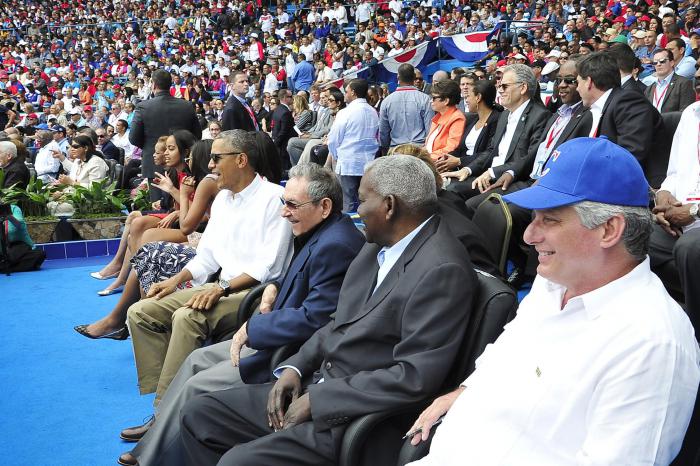
Today begins the pre-Olympic baseball tournament of the Americas, in which the Cuban team, starting at 1:00 p.m., will face its Venezuelan counterpart in West Palm Beach, Florida. However, a group that is not even remotely a majority, intends to continue playing and, of course, losing, the war. To do so, they resort to violence and, logically, to lies. The target of their attacks are the Cuban baseball players.
Protected, organized and directed by Senators Rick Scott and Marco Rubio, Congresswoman Maria Elvira Salazar, and summoned by the cheap spokesman of that leadership, Alexander Otaola, the members of that segment have organized to meet at the baseball park. There, according to Otaola himself, they will protest against the presence of representatives of the “totalitarian” government of the island. In order to guarantee their presence, the legislator even allocated resources for the purchase of tickets.
It was reported that the security of the stadium, whose responsibility falls on Scott himself, would allow the pronouncement by means of offensive posters and the throwing of objects on the field against the players. Even the attack phrases, which out of respect will not be published in the pages of this newspaper, contain obscene words. As if that were not enough, they also announced that they would attack the bus on which the athletes were being transported.
The rules of the Olympic Charter, and this is a tournament under the Olympic umbrella, since it is about the qualifying for the next Games in Tokyo, obliges the hosts to guarantee the normal development of the competition. This includes the safety of each of the participants. In other words, the U.S. authorities, both sporting and governmental, are responsible for what happens to any player.
It is not new to proceed in U.S. territory for our sports embassies. Today it is the frustrated Otaola and his bosses, losers as always, in the face of the virility of the Cuban people and their overwhelming support for the continuity of the Revolution and its successes. These are despite the blockade, more than 240 measures of an alienated president, which the current president has not even touched, and the pandemic. “Poor little ones”, how they have yet to suffer.
Next June 10 will be the 55th anniversary of the Declaration of Cerro Pelado, the name of the ship that carried the athletes to the Central American and Caribbean Games in San Juan, in colonized Puerto Rico. That text expressed the willingness of the delegation to participate, even if they had to swim there. Before, in Jamaica-1962, in a similar event, also in a baseball stadium, Sabina Park, provocateurs like those of today threw chairs and sticks against the members of the delegation, who defended themselves, causing their aggressors to flee. In 1963, in the Pan American Games in Sao Paulo, the plane carrying the athletes was not allowed to touch the airport runway, and the then-president of Inder, José Llanusa Gobels, told the pilot who landed that “we came to compete, it is our right”.
In Indianapolis-1987, the Pan American event found the same hostile environment in several of the scenarios, as in 1999, in Winnipeg, where they even authorized a newspaper, plus a radio station, to whip and incite the desertion of our delegation.
In contrast, never has a U.S. athlete, a member of their delegations or a journalist been assaulted in Cuba, neither physically nor morally. None has been insulted. In March 1999, the Baltimore Orioles baseball team was here, and its players, such as Charles Johnson, known by the fans for his presence in the 1991 Pan American Games, when he hit a decisive home run, was applauded. We gave an earlier ovation to Jim Abbott, that excellent pitcher who was missing a hand, which was not an impediment to his exceptionally. The same applied to his teammates Robin Ventura, Joe Carter or Greg Olson.
It was precisely, in the multisport meeting of America, in 1991, at the dawn of the special period, that Cuba offered US TV to broadcast the Games free of charge.
In Havana, in March 2016, the president of the United States himself attended, in a full stadium, the match between Tampa Bay and Cuba. He was received with utmost respect for his country’s anthem, its flag and his high investiture. There is not a single outrage or slander from the sports press to U.S. athletes. US Baseball players have been received in the bilateral tops and, later, these same people have admired their results in the major leagues, as in the recent cases of Maikel Conforto or Carlos Rodon, the latter author of a zero hit zero runs in this major league season, which was praised by the national sports chronicle.
It has never occurred to anyone that, because of political or ideological differences or because of a criminal blockade, ordered to starve, the work of the governments of the United States, that a baseball player should be booed or mistreated. The same for its President, who sat, with his family, behind home plate at the Latinoamericano sports stadium, a place where the daughter of the legendary Jackie Robinson, received, on behalf of her father, the prolonged applause of tribute to the first Black player in MLB.
Those who today seek to attack and repudiate the Cuba team in Florida have recognized, as they themselves published in social networks, that the issue is political, and it does not matter that they are athletes, artists, journalists or doctors, that they are not government officials. They, like their bosses, do not act against governmental structures, they act against the people, because that, people, are the ball players, whom Otaola, disrespectfully, called hairy rats.
By the way, the players who are looking for their Olympic ticket are clear that their mission there is to play baseball and give a good show to the crowd and to many of their followers who will go to support them. They seek they want the victory of their country, like those who this weekend spoke out against the blockade in several U.S. cities.
For the haters, even if they do not understand a thing, we leave them two messages in the voices of Martin Luther King, Jr., pastor of the Baptist Church, and José Martí. The Cuban-born Martí said: “Nothing a man does debases him more than to allow himself to stoop so low as to hate someone”. And the most universal of Cubans portrayed them: “The barbarians who entrust everything to force and violence, build nothing, because their seeds are of hatred”.
The Palestinian catastrophe of 1948

The Palestinian catastrophe of 1948
Every May 15 is commemorated the Day of the Nakba, or catastrophe, in Palestine, the date on which around 800,000 Palestinian civilians were expelled after the occupation of their lands and homes in 1948. Only one day had passed since the proclamation of the State of Israel in the Palestinian territory and it was already showing its expansionist and usurping nature.
Author: Jorge Mazón Rodríguez | internet@granma.cu
May 15, 2021 02:05:11 AM
Translated and edited by Walter Lippmann for CubaNews.
Every May 15 is commemorated the Day of the Nakba, or catastrophe, in Palestine, the date on which around 800,000 Palestinian civilians were expelled after the occupation of their lands and homes in 1948. Only one day had passed since the proclamation of the State of Israel in the Palestinian territory and it was already showing its expansionist and usurping nature.
The partition of Palestine, approved by the UN in November 1947, precipitated the events that had been unfolding for some time. Long before, Theodor Herzl had outlined the foundations of Zionism and the future Jewish state. The British Foreign Secretary, Arthur James Balfour, had expressed to Baron Rothschild his government’s support for the establishment of a “national home for the Jewish people” in the region of Palestine; and the Zionists who had gradually settled in Palestine, supported by the international Jewish oligarchy, had taken advantage of Britain’s “neglect” as the mandated power in the region to organize themselves politically and militarily.
Once the cessation of the British mandate over Palestine was announced, coexistence between the Arab and Jewish communities became very tense and confrontations began in the face of the advance of the Zionist project and the refusal of the Palestinians to cede their territories. At this point, what historians call “programmed ethnic cleansing” was implemented, a deliberate policy aimed at displacing the Palestinian Arabs in order to insert the Jewish immigrants who were beginning to arrive en masse.
Yosef Weitz, director of the Land and Forestry Department of the Jewish National Fund and architect of the acquisition of land for the Jewish community in Palestine, gave ideological foundation to the expulsion policy: “It must be clear to us that there is no place for the two peoples in this country (…). We will not achieve our goal of being an independent people as long as there are Arabs in this small country. The only solution is a Palestine, at least Western Palestine (west of the Jordan River) without Arabs (…). The only way to achieve this is to move the Arabs from here to neighboring countries, to move them all; there must not be a village or a tribe left. Only in this way will the country be able to absorb millions of our own brothers. There is no other solution (…)”.
One of the most notorious acts of Zionist gang violence was the massacre perpetrated in Deir Yassin, where 254 Palestinian Arabs were brutally murdered. A former Israeli military governor of Jerusalem described it as follows: “(…) units of the Etzel and Stern gangs jointly organized, without provocation, a deliberate attack on the Arab village of Deir Yassin on the western edge of Jerusalem. There was no reason to justify the attack. It was a quiet village, which had denied entry to volunteer Arab units from across the border and had not been involved in any attacks on Jewish areas. The dissident groups chose it for strictly political reasons. It was a deliberate act of terrorism (…)”.
According to the final report of the United Nations Economic Survey Mission for the Middle East in 1949, the number of Palestinian refugees resulting from the violence and war following the proclamation of Israel as a state, amounted to 726,000, which constituted half of the indigenous population of that region. Since then, the West Bank alone, including East Jerusalem, Gaza, Syria, Jordan and Lebanon, has counted more than 5.7 million Palestinian refugees, who now face the impact of the pandemic as one of the most vulnerable populations.
After 73 years of constant threats, attacks and the Zionist attempt to deprive the Palestinians of their rights, the principles of the Palestinian cause remain unchanged, as does Cuba’s support for the return of the refugees and the two-state solution, which involves the realization of the right of the Arab people to self-determination and access to a free, independent and sovereign state, with its capital in East Jerusalem, and framed within the borders prior to the Israeli occupation of 1967.
Let this Nakba Day therefore serve to vindicate the right of the Palestinian refugee population to return to their country and their homes, and to demand the cessation of the Zionist regime’s attacks on Gaza, where civilians, distributed at a rate of 4,167 inhabitants per square kilometer, are the ones who suffer the most in each attack.
Subscribe to Blog via Email
| M | T | W | T | F | S | S |
|---|---|---|---|---|---|---|
| 1 | ||||||
| 2 | 3 | 4 | 5 | 6 | 7 | 8 |
| 9 | 10 | 11 | 12 | 13 | 14 | 15 |
| 16 | 17 | 18 | 19 | 20 | 21 | 22 |
| 23 | 24 | 25 | 26 | 27 | 28 | 29 |
| 30 | 31 | |||||


You must be logged in to post a comment.